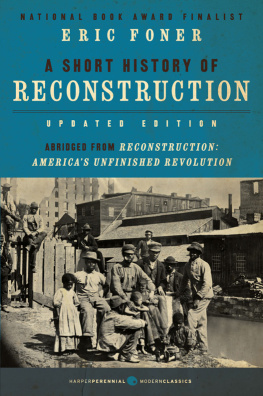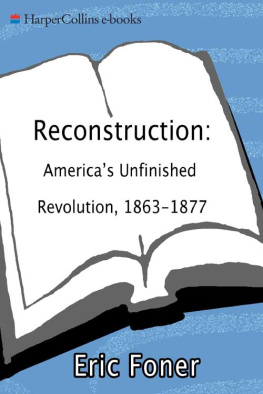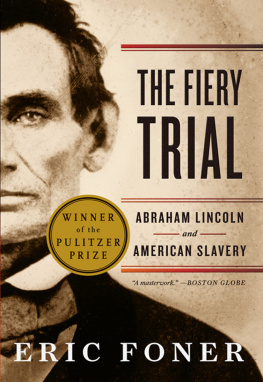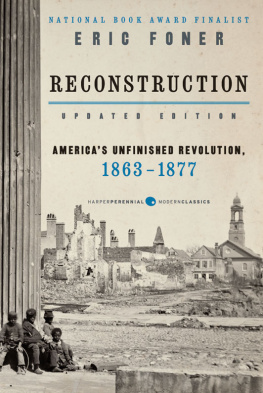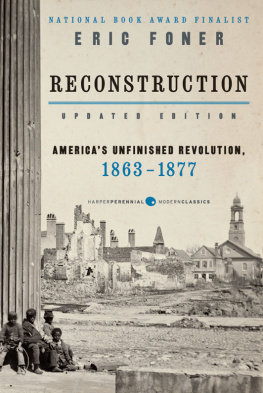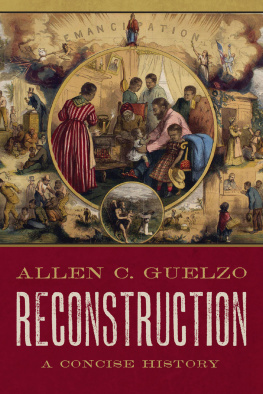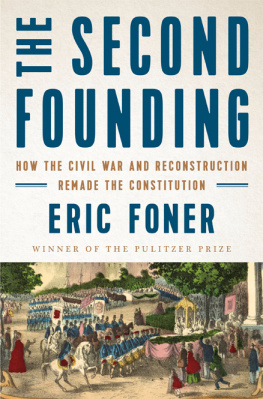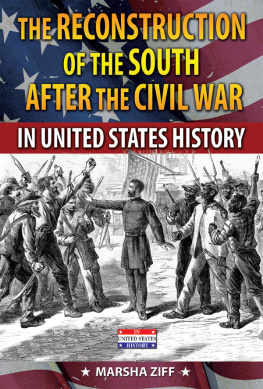Free Soil, Free Labor, Free Men: The Ideology of the Republican Party Before the Civil War
Americas Black Past: A Reader in Afro-American History (editor)
Nat Turner (editor)
Tom Paine and Revolutionary America
Politics and Ideology in the Age of the Civil War
Nothing But Freedom: Emancipation and Its Legacy
Reconstruction: Americas Unfinished Revolution, 18631877

W. E. B. Du Bois, Black Reconstruction in America (New York, 1935).
David Donald, The Grand Theme in American Historical Writing, Journal of Historical Studies, 2 (Autumn 1969), 186-201.
Eric Foner, Nothing But Freedom: Emancipation and Its Legacy (Baton Rouge, 1983).
William A. Dunning, Essays on the Civil War and Reconstruction (New York, 1904), 38485; John W. Burgess, Reconstruction and the Constitution 18661876 (New York, 1902), 133. For a recent reassessment of the Dunning School, see John David Smith and J. Vincent Lowery, ed., The Dunning School: Historians, Race, and the Meaning of Reconstruction (Lexington, 2013).
Eric Foner, Freedoms Lawmakers: A Directory of Black Officeholders during Reconstruction (rev. ed.: Baton Rouge, 1996); Claude G. Bowers, The Tragic Era (Cambridge, 1929), 364; E Merton Coulter, The South During Reconstruction 18651877 (Baton Rouge, 1947), 14144.
The online version of the exhibit can be found at http://www.digitalhistory.uh.edu/exhibits/reconstruction/index.html. Eric Foner and Olivia Mahoney, Americas Reconstruction: People and Politics After the Civil War (Baton Rouge, 1997) is a catalog of the exhibition.
Eric Foner, Forever Free: The Story of Emancipation and Reconstruction (New York, 2005). (This volume contains inserts assembled by Joshua Brown examining the eras visual iconography.) Eric Foner, The Story of American Freedom (New York, 1998).
The notes that follow mention only a small part of the voluminous recent literature on Reconstruction. For a comprehensive bibliography through the year 2000, see David A. Lincove, Reconstruction in the United States: An Annotated Bibliography (Westport, 2000). Thomas J. Brown, ed., Reconstructions: New Perspectives on the Postbellum United States (New York, 2008) contains historiographial essays tracing the evolution of Reconstruction scholarship.
Laura F. Edwards, Gendered Strife and Confusion: The Political Culture of Reconstruction (Urbana, 1997); LeeAnn Whites, The Civil War as a Crisis in Gender: Augusta, Georgia, 18601890 (Athens, 1995); Nancy Bercaw, Gendered Freedoms: Race, Rights, and the Politics of the Household in the Delta, 18611875 (Gaineswille, 2003); Elizabeth Regosin, Freedoms Promise: Ex-Slave Families and Citizenship in the Age of Emancipation (Charlottesville, 2002); Tera Hunter, To Joy My Freedom: Southern Black Womens Lives and Laborers After the Civil War (Cambridge, 1997); Susan E. ODonovan, Becoming Free in the Cotton South (Cambridge, 2007); Jane T. Censer, The Reconstruction of White Southern Womanhood, 18651895 (Baton Rouge, 2003).
Thavolia Glymph, Out of the House of Bondage: The Transformation of the Plantation Household (New York, 2008); Martha S. Jones, All Bound Up Together: The Woman Question in African American Public Culture, 18301900 (Chapel Hill, 2007).
Rebecca J. Scott, Degrees of Freedom: Louisiana and Cuba After Slavery (Cambridge, 2005); Demetrius L. Eudell, Political Languages of Emancipation in the British Caribbean and the U.S. South (Chapel Hill, 2002); Frederick Cooper, Thomas C. Holt, and Rebecca J. Scott, Beyond Slavery: Explorations of Race, Labor, and Citizenship in Postemancipation Societies (Chapel Hill, 2000).
Lynda J. Morgan, Emancipation in Virginias Tobacco Belt, 18501870 (Athens, 1992); Jeffrey Kerr-Ritchie, Freedpeople in the Tobacco South, Virginia, 18601890 (Chapel Hill, 1999); John Rodrigue, Reconstruction in the Cane Fields: From Slavery to Free Labor in Louisianas Sugar Parishes, 18621880 (Baton Rouge, 2001); Moon-Ho Jung, Coolies and Cane: Race, Labor, and Sugar in the Age of Emancipation (Baltimore, 2006). For the transition in one part of the cotton South see Julie Saville, The Work of Reconstruction: From Slave to Wage Laborer in South Carolina,18601870 (New York, 1994).
Steven Hahn, A Nation Under Our Feet: Black Political Struggles in the Rural South, From Slavery to the Great Migration (Cambridge, 2003).
Jane Dailey, Before Jim Crow: The Politics of Race in Postemancipation Virginia (Chapel Hill, 2000); Gregory P. Downs, Declarations of Dependence: The Long Reconstruction of Popular Politics in the South, 18611908 (Chapel Hill, 2011); Michael W. Fitzgerald, Urban Emancipation: Popular Politics in Reconstruction Mobile, 18601890 (Baton Rouge, 2002); Wang Xi, The Trial of Democracy: Black Suffrage and Northern Republicans, 18601910 (Athens, 1997).
Bruce E. Baker, What Reconstruction Meant: Historical Memory in the American South (Charlottesville, 2007), W. Fitzhugh Brundage, The Southern Past: A Clash of Race and Memory (Cambridge, 2005). David Blight, Race and Reunion: The Civil War in American Memory (Cambridge, 2001), the most influential recent book on historical memory, begins with a discussion of Reconstruction.
Heather C. Richardson, The Death of Reconstruction: Race, Labor, and Politics in the PostCivil War North, 18651901 (Cambridge, 2001); Sven Beckert, The Monied Metropolis: New York City and the Consolidation of the American Bourgeoisie, 18501896 (New York, 2001); Andrew L. Slap, The Doom of Reconstruction: The Liberal Republicans in the Civil War Era (New York, 2006); Mitchell Snay, Fenians, Freedmen, and Southern Whites: Race and Nationality in the Era of Reconstruction (Baton Rouge, 2007); Amy D. Stanley, From Bondage to Contract: Wage Labor, Marriage, and the Market in the Age of SlaveEmancipation (New York, 1998); Gunther Peck, Reinventing Free Labor: Padrone and Immigrant Workers in the North American West, 18801930 (New York, 2000).
Many of these documents have been published in the Freedom Series, a work still in progress: Ira Berlin, et al., ed, Freedom: A Documentary History of Emancipation, 18611867 (New York and Chapel Hill, 1982 ).
Nicholas Lemann, Redemption: The Last Battle of the Civil War (New York, 2006); Stephen Budiansky, Bloody Shirt: Terror After Appomattox (New York, 2008); LeeAnna Keith, Colfax Massacre: The Untold Story of Black Power, White Terror, and the Death of Reconstruction (New York, 2008); Charles Lane, The Day Freedom Died: The Colfax Massacre, the Supreme Court, and the Betrayal of Reconstruction (New York, 2008); James K. Hogue, Uncivil War: Five New Orleans Street Battles and the Rise and Fall of Radical Reconstruction (Baton Rouge, 2006); Lou F. Williams, The Great South Carolina Ku Klux Klan Trials, 18711872 (Athens, 2004).
Christopher L. Brown, Moral Capital: Foundations of British Abolitionism (Williamsburg, 2006); Moon-Ho Jung, Reckoning with Empire: Race, Freedom, and State Power Across the Pacific, paper delivered at Wiles Symposium, Queens University, Belfast, 2008; Marilyn Lake and Henry Reynolds, Drawing the Global Colour Line: White Mens Countries and the International Challenge of Racial Equality (New York, 2008).
Many of the works cited above pursue this theme. See also Heather A. Williams, Self-Taught: African-American Education in Slavery and Freedom

